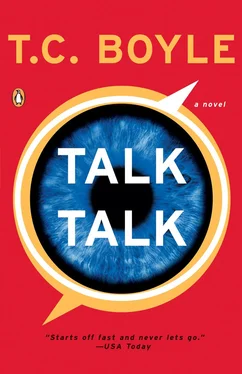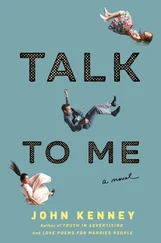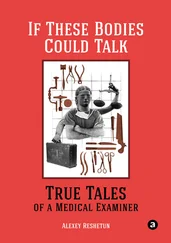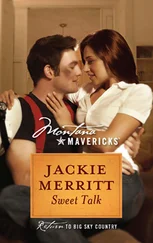It didn't do him much good-if there was a blip in the receipts it was too small to notice. But the ad itself (it wasn't even an ad, just a cheesy coupon in the Thursday morning insert), aside from costing him money, seemed to suck the last shred of class out of the place. He hated it. Hated the way it looked on the page, the lame line drawing of a stereotypical grinning potbellied mustachioed greaseball of an Italian chef holding up a vertical pizza in defiance of gravity beneath the legend “Pizza Napoli, Buy One Regular Size Pizza with One Topping, Get the Next One Free.” Christ, he might as well have been selling hula hoops.
And then there was Gina. He wasn't allowed to contact her, but he still had the right to see his daughter every Sunday, all day Sunday, whether Gina liked it or not, and his lawyer contacted her lawyer and worked out an arrangement whereby Gina's mother would bring Sukie to some neutral place and he would pick her up. They agreed on McDonald's-she loved McDonald's, more for the playground than the food, the vanilla shake thick as sludge and the shrunken little patty of whatever it was they slipped between the grease-soaked bun, no ketchup, no mustard, no onions, neither of which seemed to interest her beyond the first sip and the first bite-and Gina's mother was consistently late. He sat there in the Mustang, checking his watch every ten seconds, kids all over the place, but not his kid, and when Gina's mother did show she never apologized or even said word one, handing Sukie over as if she were giving her up to a child molester. Did he hate that woman, with her surgically restructured face and her liposuction and frozen hair and the way she locked up her features and threw away the key as if just to look at him was an ordeal? Yes, sure he did. And he hated Gina for what she'd done to him. And the Bullhead-just hearing his voice on the phone, the hectoring nag of a voice going on and on about the menu at Pizza Napoli, the books, the bottom line: “You're not offering the public what they want. You know why? Because you get stuck on one thing. Listen to me: you're screwing up. Big-time. Wake up, will you?” Not to mention Stuart Yan, who was suing him for damages in civil court. It had to come to a head. A saint would have broken under the pressure, and he never claimed to be a saint.
It was a Sunday and he was sitting in the car outside McDonald's, reading the sports page, watching the leaves change, checking his watch-nine o'clock, nine-thirty, ten-and Gina's mother never showed. His first impulse was to drive out there and do some damage, confront the bitch, tear the house down if that was what it took, but he suppressed it: that was a ticket to jail. He checked his watch again. A guy came out the door, a nobody, a nonentity in flip-flops and shorts, and he had his two kids by the hand and they were one happy family, their Egg McMuffins tucked away and the park or a football game in their immediate future or maybe a cruise up the river to see how the leaves looked against the water. He wanted to call, but that was against the rules too. At eleven, sick with rage, he gave it up and drove to the restaurant to discover a message on the machine: “Just to let you know,” Gina's mother's pinched voice came at him as if she were hollering down a tunnel, “Sukie won't be coming today because of the ballet at Carnegie Hall. The whole family's going.”
He listened to the message twice through, standing there over the phone in his office at the back of the building, struggling for control. There were stains on the wall. The place smelled of marinara sauce, a dark ancient funk of it, and of the grease extruded from the pepperoni and the cheese burned to the walls of the oven. They thought they'd beaten him down, marginalized him, taken him out of the equation-before long, he'd be erased altogether. That was what they thought, but they were wrong. He could have called his lawyer and started up that whole dance again, could have complained, and yet he didn't see what good that would do-they had their own lawyer. Up to this point, he'd played by the rules. Now the rules were off.
In the morning, as soon as the offices were open, he put in calls to the phone company, the gas, electric and water, identifying himself as John Marchetti and ordering a stop service on all utilities at the house. He filed a change of address at the post office, then called American Express and Visa-the two cards he'd seen the Bullhead flash-and claimed he'd lost his wallet and wanted replacement cards overnighted by FedEx. When the new cards arrived at the post-office box he'd set up, he began to order things for delivery to 1236 Laurel: a new washer and dryer; an antique slate pool table that weighed over a thousand pounds; a pair of purebred Dalmatians; a deluxe fourteen-jet hot tub that could accommodate six people comfortably. That was just the beginning. He canceled Gina's cell, canceled her credit cards, went down to the bank and closed out their joint savings account. And Yan. He went after Yan too, but in a more immediate way. A week later, after he'd closed the restaurant for the night and made the rounds of the bars, he found Yan's Nissan parked out front of his apartment and poured six plastic jugs of muriatic acid over the finish, then slashed the tires and took out the windshield for good measure. The night was cold, his breath steaming, the tire iron flashing under the street lamp like a sword of vengeance, and maybe somebody saw him there or maybe it was the post-office box, maybe that was it. He never knew really. In fact, he was still asleep when they came for him, and he never did remember his toothbrush.
By the time he got round to cooking, it was past seven and Madison was distracted and whiny. She sat at the kitchen table, pounding her legs back and forth under the chair as if she were on a swing set at the playground, watching him poach the gnocchi while the cordon bleu began to send up signals from the oven and the white sauce thickened in the pan and the zucchini simmered in olive oil, red wine, garlic and chopped basil, the flame up high just before he cut it down nearly to nothing. There was an untouched glass of milk in front of her and the croque monsieur he'd made her from a heel of French bread and the leftover slices of prosciutto and Emmentaler browned in the pan. He could see the semicircular indentation her upper teeth had made in the sandwich when she'd lifted it to her mouth and then decided she wasn't going to eat it after all because she was cranky and tired and sugared-out in honor of Dunkin' Donuts Day at camp and because he wanted her to eat and her mother wanted her to eat and she didn't want to do what anybody wanted her to do, not in her present mood.
For his part, he was through coaxing her. She could kick away all she wanted and she could pout and mug and whine that the milk was too warm and the sandwich too cold or plead for him to read her a story or at least let her get up from the table and watch TV, but he was in a zone-he was enjoying himself, the meal coming to fruition, two sips left of the vodka martini on the counter and the Orvieto on ice. Natalia had set the table on the deck-it was an uncharacteristically mild evening, the fog held at bay, at least temporarily-and she was out there now, martini in one hand, magazine in the other. After the spa, she'd spent the afternoon shopping with Kaylee, and she'd come home in a delirium of shopping bags, the slick shining colors catching the light, her hair swept back, her smile quick and unambiguous and her mood elevated. Definitely elevated. She insisted on trying things on for him-“Did he like this one? Did he? Was he sure? It wasn't too, too… was it?”-and Madison was summoned to try on the three outfits she'd got for her (hence the mood and the lateness of the meal).
He hadn't told her a thing yet, just that he had a surprise for her. While she'd been out shopping, he'd been shopping too, and he'd traded the Z4 in on a Mercedes S500 sedan with charcoal leather seats, burl walnut trim, an in-dash GPS navigator system and Sirius satellite radio, in a sweet color they called Bordeaux Red. There was a price differential, of course-a considerable one, and he knew he was being taken, the salesman pulling some sort of phony accent on him and kissing his ass from the front door to the desk and back again-but that hardly mattered. The Beemer was his down (the pink slip signed over to him by none other than Dana Halter) and there were no payments for the first six months, by which time it really wasn't relevant. Now, as he dodged from one pan to the other, checking the cordon bleu, dipping the gnocchi out of the pot and slipping them onto a greased sheet for a three-minute browning in the oven, he was burning up with the need to show it to her, to show it off and see the look on her face. That was how he'd planned it out, the new car first, the thrill of it, maybe a ride round the block or over the bridge, and then he'd give her the news: Business. An opportunity on the East Coast. But it would be a vacation, a vacation too-see the sights. Didn't she want to live in New York? Hadn't she always said that? New York?
Читать дальше












